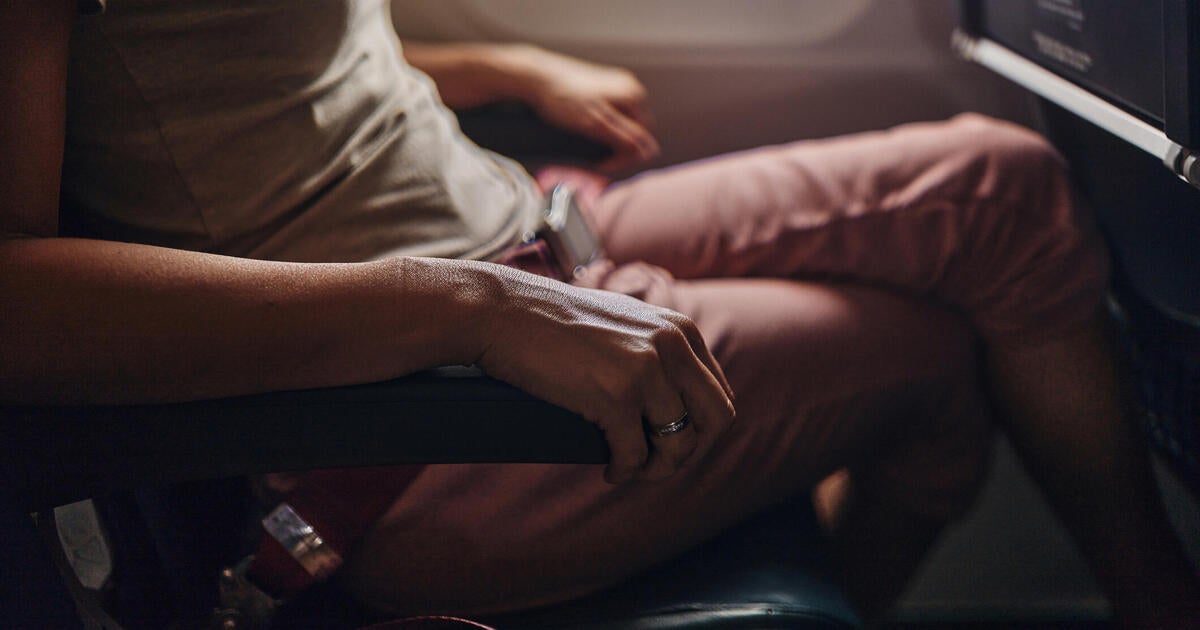Watch CBS News
By Sara Moniuszko
Edited By
/ CBS News
If headlines of recent plane crashes and close calls have you worried about air travel, you’re not alone — but there are things to keep in mind to help ease anxiety about flying.
While most Americans still believe air transportation is generally safe, confidence in air travel and the federal agencies in charge of air safety has fallen, according to a recent poll from The Associated Press-NORC Center for Public Affairs Research.
The survey found that 64% of U.S. adults say they think plane travel is “very safe” or “somewhat safe,” but that’s down slightly from last year, when 71% said so. About 20% now say they consider air transportation is very or somewhat unsafe, up from 12% in 2024.
The poll was conducted shortly after the deadly Jan. 30 collision between an American Airlines flight and an Army Black Hawk helicopter in Washington, D.C., but before the Feb. 17 incident where a Delta flight from Minneapolis flipped upside down while landing in Toronto.
In an interview with CBS News Wednesday, Transportation Secretary Sean Duffy sought to reassure Americans that “of course” it’s safe to fly.
“If you get in a plane, if you look at how many people fly, how many flights we have, of course it’s a safe space,” Duffy said. He noted that there isn’t a pattern behind the recent incidents, calling each of them “very unique,” and said investigators will determine what went wrong so systems can continue to improve.
Psychologist Harry Cohen told CBS News it’s “completely normal and understandable” for people to deal with fears around flying, especially after seeing incidents like these. But experts say there are ways to cope and manage these anxieties.
“There are so many (strategies), and it really depends on the person. Number one is, do what works for you,” said Cohen, whose work, including his book “Be The Sun, Not The Salt,” focuses on helping people become their best selves.
Here are some suggestions to consider.
The odds of dying in a commercial air accident was about 1 in 13.7 million from 2018 to 2022 — a much lower rate than car crash deaths in 2023, where the odds were 1 in 95, according to the National Safety Council.
“Statistically, flying is way safer than any other form of transportation. However, the stories, the tragedies, the crashes — they make us think that it isn’t,” Cohen said.
This is called “availability bias,” explains Alyssa Mairanz, a licensed mental health counselor and owner of Empower Your Mind Therapy.
“Our minds tend to recall events or pieces of information more easily when it’s been viewed recently, making it seem more common than it actually is,” she told CBS News.
Avoiding or limiting your exposure to upsetting content related to flights can help calm your thoughts.
“Stop watching the news or obsessing over it, because ruminating with negative thoughts can sometimes make you feel worse,” Mairanz said.
Cohen said to be mindful that you can’t un-see an image.
“Once you’ve seen the plane flip over and on the Toronto tarmac, you can’t not see that image,” he said, adding that you’ll likely have to pair this with other coping strategies.
To reduce anxiety around flying, Cohen suggests preparing as best you can.
“Anything that creates more generalized anxiety is not going to be helpful,” he said. This includes giving yourself enough time to avoid rushing. And he suggests avoiding caffeine and alcohol.
“People might think taking a few drinks is helpful. It usually isn’t,” he said.
Take time to mentally prepare, too.
“Remember all the things that you know about flying, because you’ve flown for many, many years and it is a very safe means of transportation,” he said.
Traveling with a friend or striking up conversation with your seatmate can also help.
“Talking to someone next to you, holding their hand… it can help,” Cohen said.
Don’t ignore the flight professionals, either.
“Flight attendants are skilled at talking to you and helping you feel less anxious. They can give you more information and come by and check on you,” he said
You can also talk to a doctor about medicinal support.
“There’s medication that can calm your nerves prior to flying so that you’re prepared — whether that’s a an anti-anxiety medication, which you take on occasion, or a beta blocker, which is for performance anxiety … it calms your physiological symptoms,” Cohen said.
While on a flight, use healthy distraction to avoid negative thoughts. This could be a movie, a game on your phone, a book or any activity that keeps your mind busy.
“It’s not going to change the fact that you’re not in control — you’re not flying the plane, but you have to relinquish that control and do only what you can do, which is, I can control my body. I can control some of my thoughts, and I can regulate my emotions. I can listen to music that is either calming or uplifting. All of those things are are good emotional shifters,” Cohen said.
Mairanz said the acronym TIPP, a exercise used in Dialectical Behavior Therapy, can help regulate extreme emotions quickly. Here’s how to adapt it for travel:
T – Temperature: Whether it’s putting a cold drink to your cheek or blasting the A/C in your face, the coolness can “trigger the ‘dive response,’ which lowers heart rate and activates your parasympathetic nervous system,” she explained.
I – Intense exercise: “Intense exercise can bring down the ‘flight-or-fight’ response, releasing endorphins and taking your mind off negativity,” Mairanz said. “Try fast-paced walking in the airport for a moment or opening and closing your arms quickly inflight — within reason to avoid hitting your seat mate.”
P – Paced breathing: “Focusing on your breath helps gain control of your thoughts. Close your eyes and breathe in deeply. Can you feel your belly move in and out? Try it again several times, lengthening your breath in and out, trying to exhale longer than inhaling. Focus on your breath, not your mind, as your body begins to calm,” she said.
P – Paired muscle relaxation: Tensing and relaxing your muscles can help let go of stress tension in the body, Mairanz said. “As you inhale, clench your muscles tightly and release on the exhale. Try this several times focusing on different parts of the body,” she suggested.
It’s valid to have anxiety over flying, but recognize if it’s starting to negatively impact your life.
“If it starts to become all-consuming, it may be best to talk with a therapist about your fears and additional skills to overcome it,” Mairanz said.
Sara Moniuszko is a health and lifestyle reporter at CBSNews.com. Previously, she wrote for USA Today, where she was selected to help launch the newspaper’s wellness vertical. She now covers breaking and trending news for CBS News’ HealthWatch.
© 2025 CBS Interactive Inc. All Rights Reserved.
Copyright ©2025 CBS Interactive Inc. All rights reserved.




